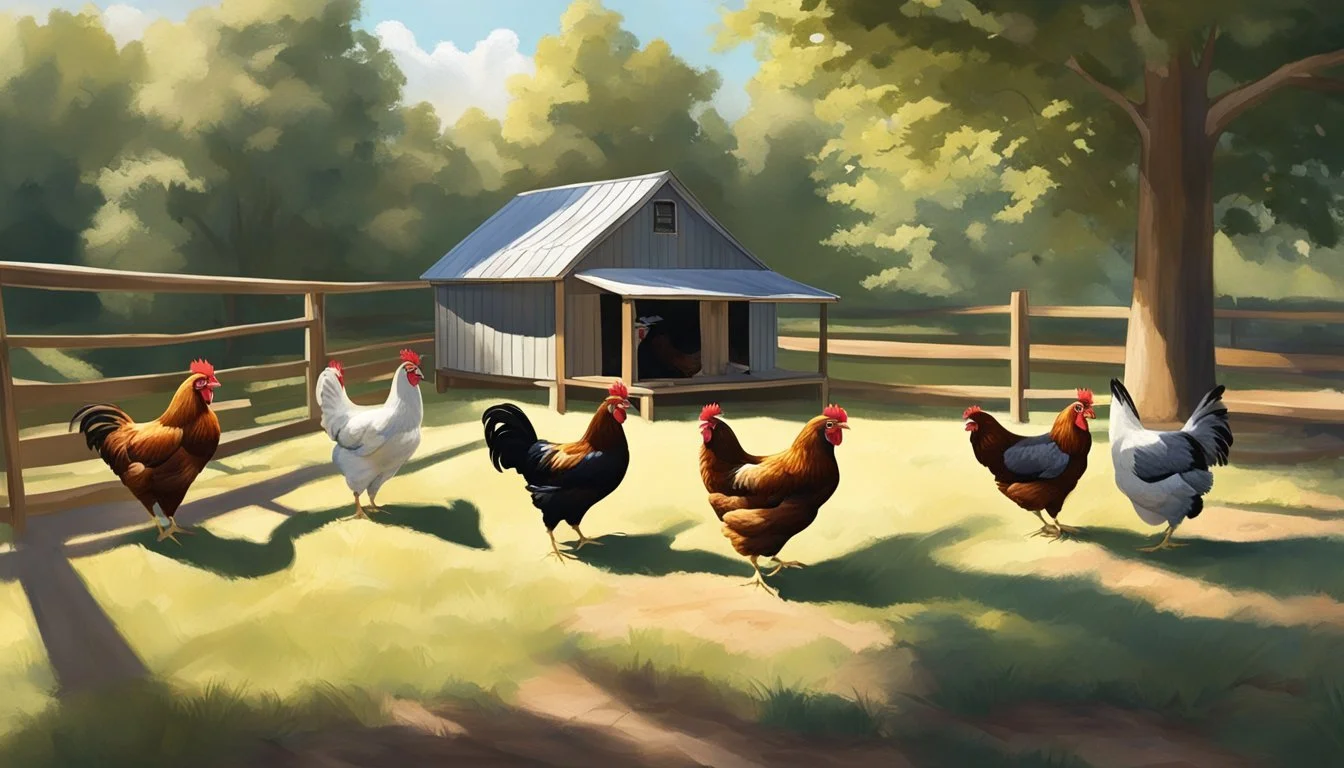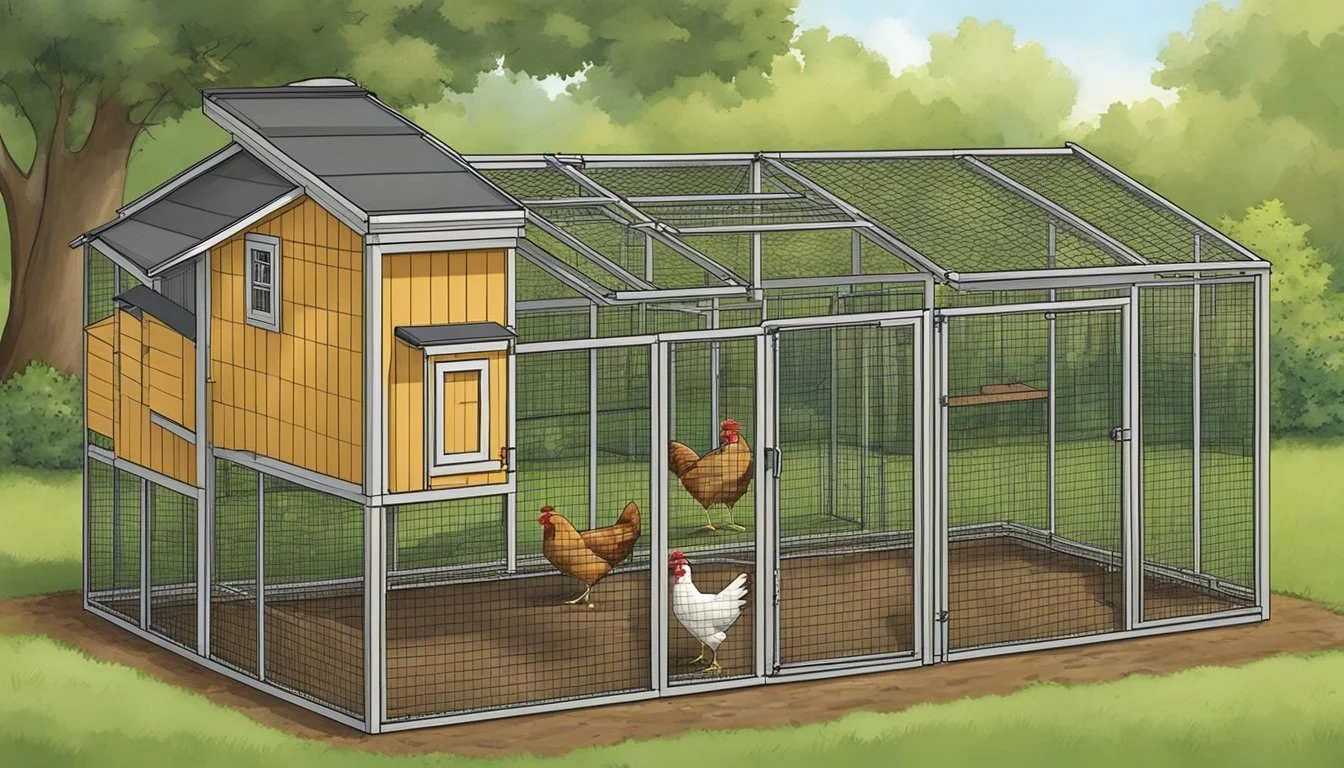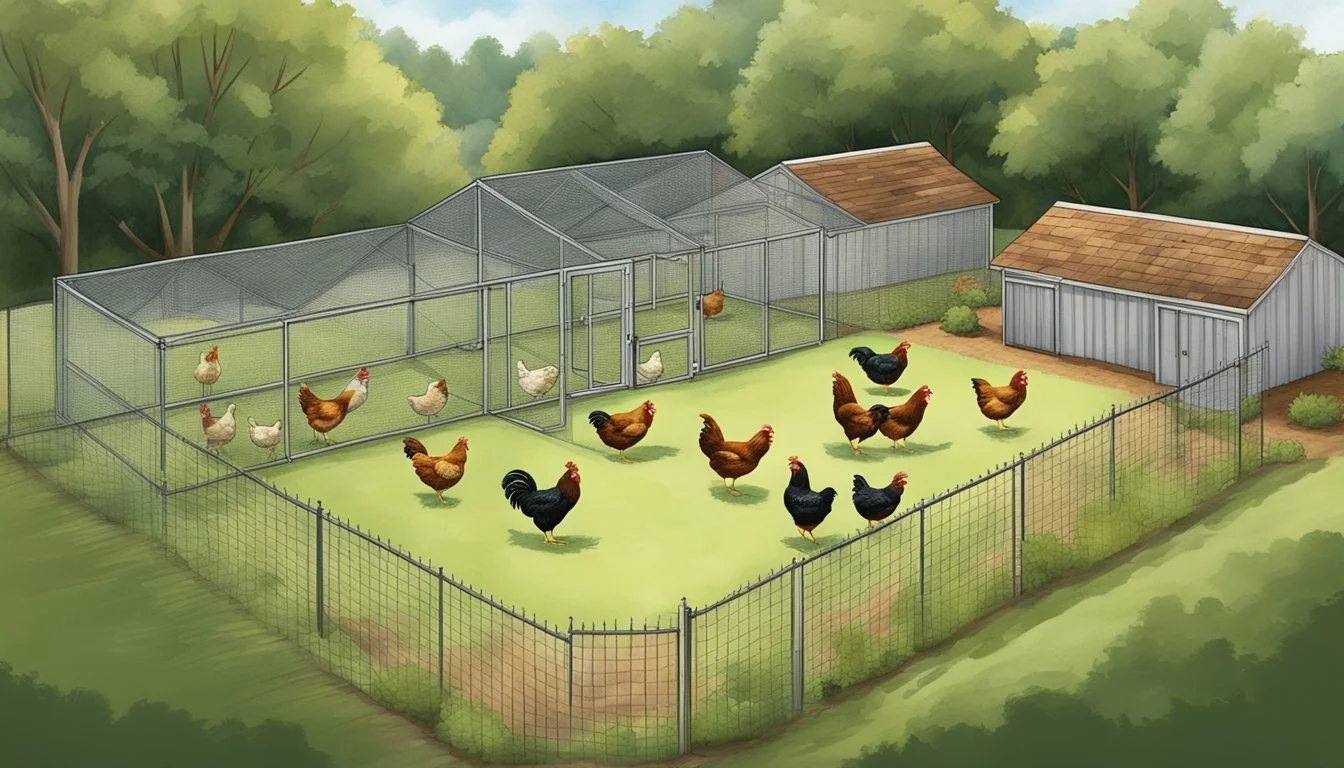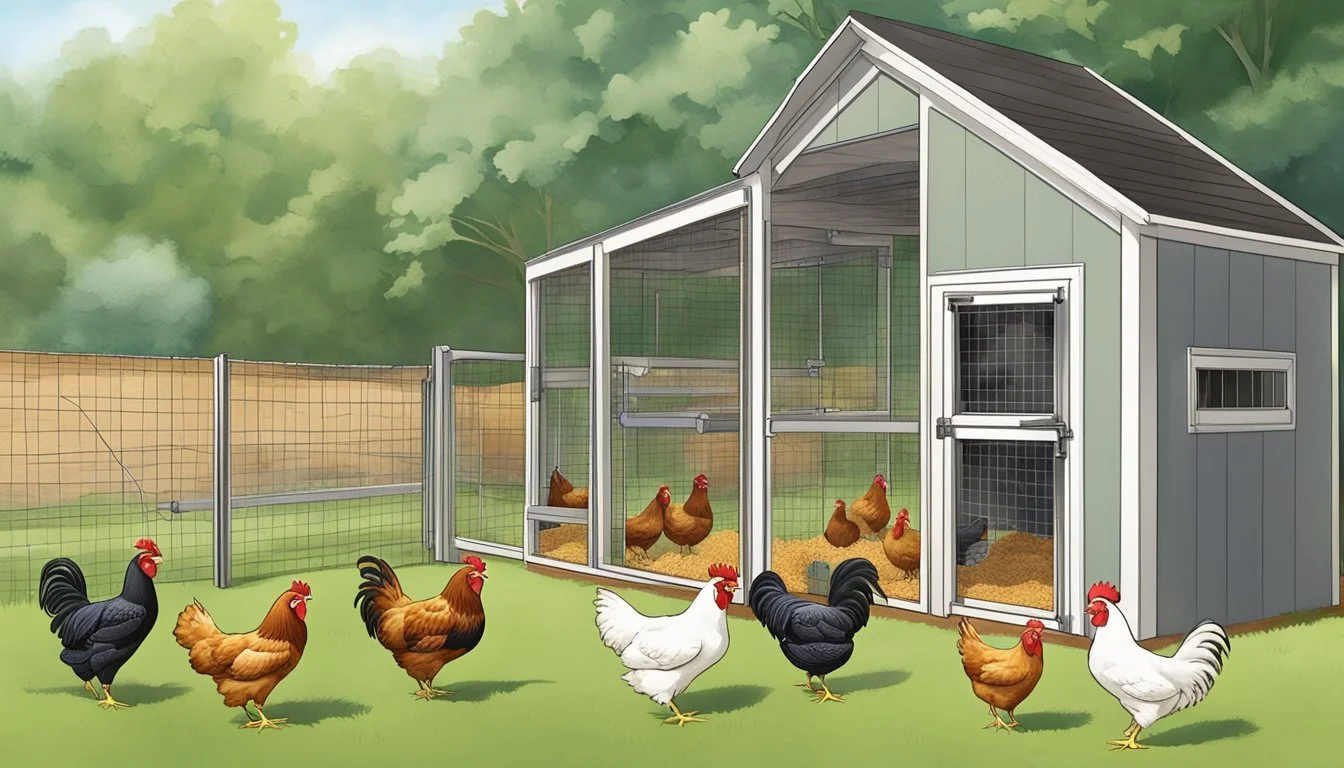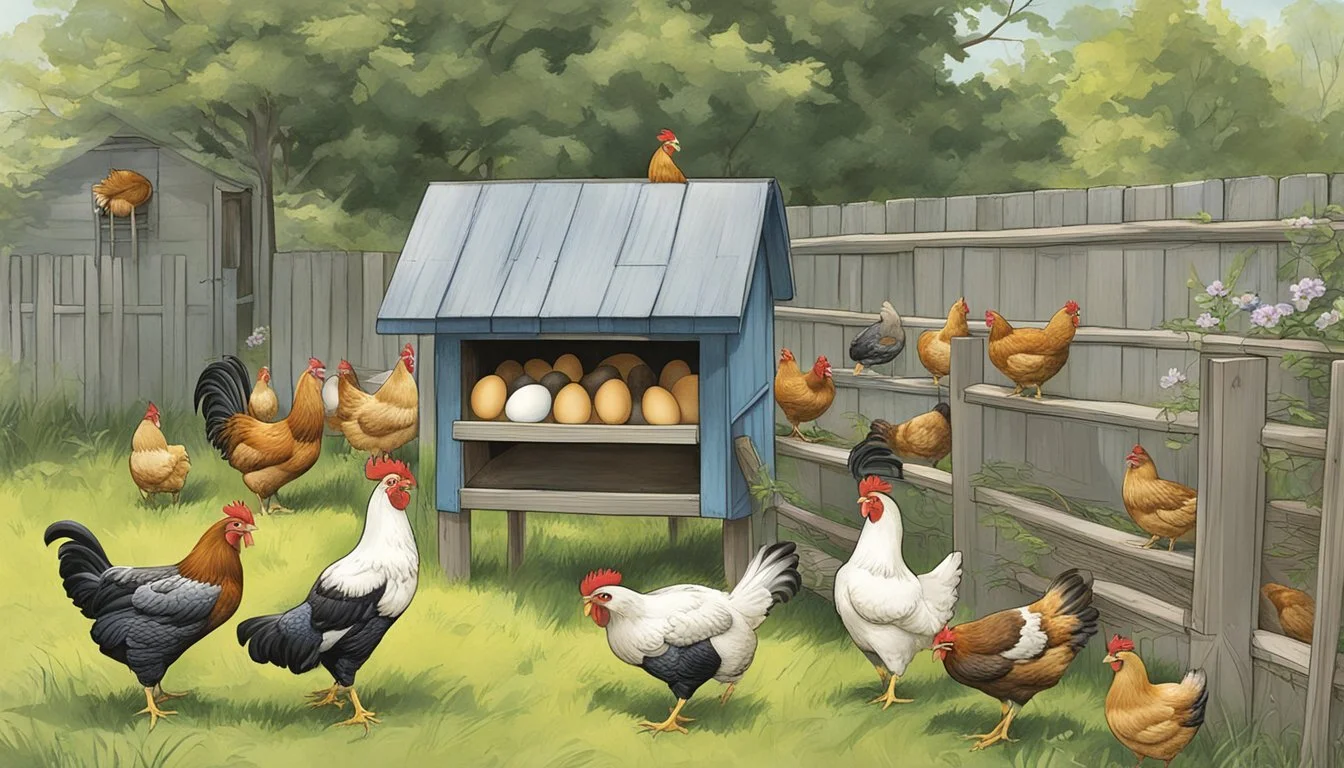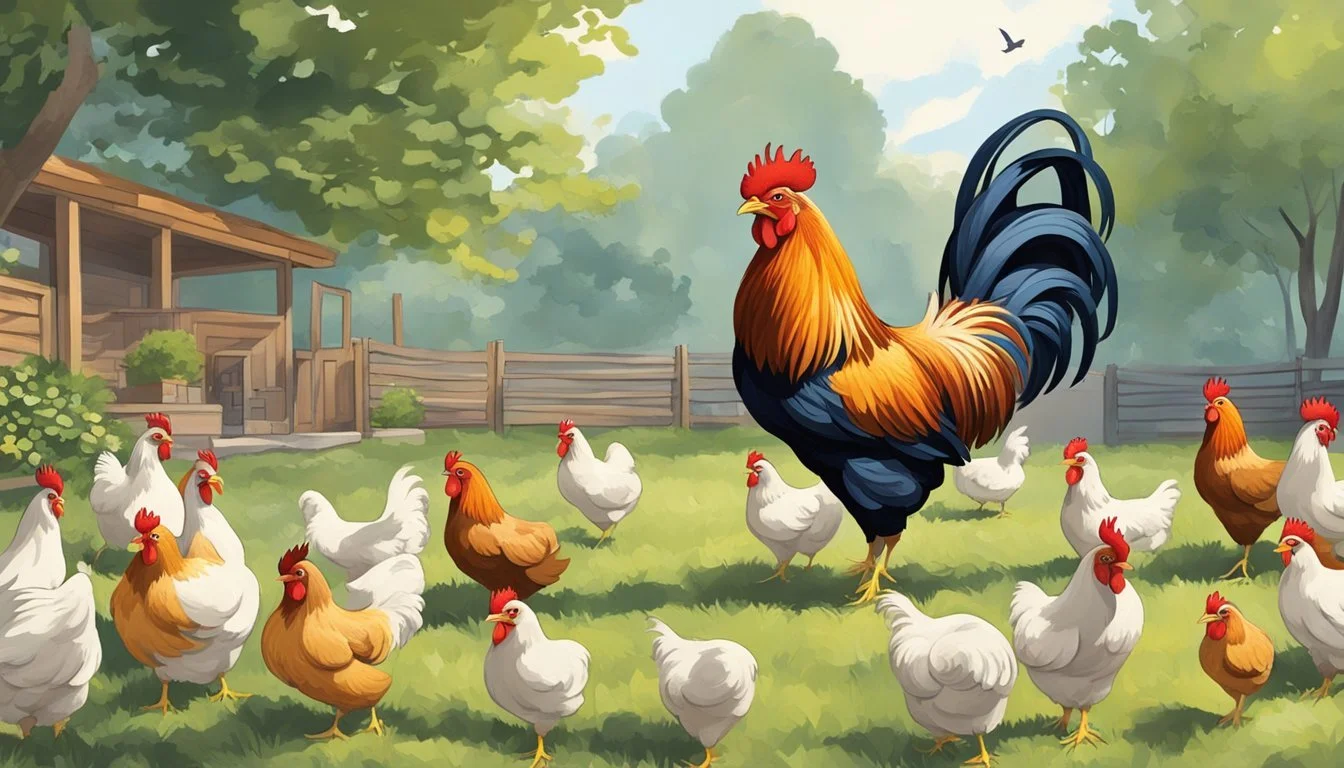Raising Backyard Chickens in Albany, GA
Your Ultimate Guide to Urban Poultry
Raising backyard chickens has become a popular trend among residents of Albany, Georgia, providing a sustainable source of fresh eggs and the joy of caring for these dynamic birds. The city has established ordinances to ensure that the practice is conducted in a manner that is considerate to neighbors and safe for the animals. According to local regulations, chickens must be kept at least 25 feet away from any dwelling, and feed is required to be stored in rat-proof containers within city limits.
The community of Albany has embraced the backyard chicken movement, creating avenues for enthusiasts to share their experiences and tips through social media groups and local gatherings. This collective knowledge allows for a smooth transition for beginners into the world of poultry keeping while adhering to the city’s guidelines. As urban farming gains traction, cities like Albany are showcasing how it is possible to integrate the agrarian lifestyle within the urban environment.
In Albany, GA, keeping domestic fowl comes with clear stipulations designed to ensure that this activity does not interfere with the quality of life within the community. The care and effort involved in properly maintaining a backyard flock underline the importance of understanding local ordinances. With a climate conducive to raising chickens and a community of seasoned poultry keepers, Albany provides a supportive backdrop for city residents looking to embark on the adventure of raising backyard chickens.
Understanding Local Chicken Laws
When considering raising backyard chickens in Albany, Georgia, it is crucial for residents to familiarize themselves with the specific local ordinances and housing restrictions to ensure legal compliance.
Permits and Regulations
Albany, Georgia, has specific local ordinances that regulate the keeping of backyard chickens. Residents must abide by these regulations to legally raise chickens within city limits. According to the Albany Georgia Chicken Ordinance, it is unlawful for individuals to possess domestic fowl for commercial, trade, or resale purposes without proper authorization.
Feed Storage: Feed must be stored in rat-proof containers.
Distance Regulations: Chicken coops must be situated at least 25 feet away from any dwelling.
It is advisable for residents to check with Albany's local government or relevant municipal department for any permits that may be required before establishing a backyard flock.
Housing Restrictions
Housing and containment of chickens in Albany are subject to regulation to ensure the welfare of the birds as well as addressing any public health or nuisance concerns. Specific housing restrictions laid out by local ordinances include:
Coop Location: Chicken coops must adhere to the 25-foot distance rule from dwellings, thereby reducing potential disturbances to neighbors.
Sanitation and Maintenance: Coops should be maintained in a clean, odor-free, and sanitary condition to prevent attracting pests and the proliferation of diseases.
Residents must follow these guidelines strictly. Failure to comply with local housing restrictions may result in fines or other enforcement actions by city authorities.
Choosing the Right Breeds for Your Flock
When selecting chicken breeds for a backyard flock in Albany, GA, prospective poultry keepers must consider climate adaptability, egg production, and desired use of the chickens—whether for eggs, meat, or both.
Egg Laying Breeds
Chicken breeds renowned for their egg-laying prowess can provide a consistent supply of fresh eggs. The Australorp is an excellent choice, known for its resilient nature in various climates and its considerable egg output. Additionally, Leghorns are prolific layers, famous for their large white eggs, and they are well-suited for Albany’s warm climate.
Meat Breeds
For those interested in raising chickens for meat, selecting breeds that grow quickly and have a large body size is crucial. The Cornish Cross is a breed that excels in rapid growth, making it a standard choice for meat production. Jersey Giants, as their name suggests, are large birds with a calm temperament, providing substantial quantities of meat.
Dual-purpose Breeds
Dual-purpose breeds offer a balanced solution, providing both eggs and meat. Rhode Island Reds are hardy chickens with a friendly temperament, delivering excellent egg production and a reasonable amount of meat. Sussex chickens, with their striking appearance and sociable nature, adapt well to free-range environments while being reliable layers and having a good size for meat. Another versatile option is the Plymouth Rock, known for its docile temperament, making it an ideal bird for backyard flocks seeking dual benefits.
Designing and Building Your Chicken Coop
When constructing a chicken coop in Albany, GA, it's paramount to focus on size, protection against local predators, and ensuring proper ventilation to maintain the health and safety of the chickens.
Coop Size and Dimensions
The coop should offer adequate space for each chicken, typically accounting for 2-3 square feet per bird inside the coop and 8-10 square feet in the outdoor run. Starting with the precise number of chickens you intend to keep, one can design a coop with dimensions that prevent overcrowding. For example, a flock of 6 chickens should have a coop measuring at least 18 square feet and a run of at least 48 square feet.
Protecting from Predators
Effective predator protection is a significant concern in Albany, GA, where animals such as coyotes, raccoons, foxes, hawks, and owls are known to prey on poultry. Reinforcement with hardware mesh—not chicken wire—is advised, as it's sturdy enough to deter these predators. The coop should have a secure closure mechanism for all doors and windows, and a buried perimeter of mesh around the coop can prevent predators from digging underneath.
Ensuring Proper Ventilation
Chickens require a well-ventilated space to thrive, which helps to remove moisture, ammonia fumes, and prevents respiratory issues. Ventilation should be situated high, such as near the roof, to allow for air circulation while keeping the sleeping area free from drafts. Louvered vents or windows covered with mesh can be used to safeguard against predators while allowing airflow.
Setting Up the Chicken Run and Roosts
When establishing a chicken run and roosts in Albany, GA, one must consider the local climate and predators. A secure, spacious environment is paramount for the health and well-being of backyard chickens.
Run Requirements
Location and Size: The chicken run should be positioned in a well-drained area to prevent water accumulation and possible disease spread. An ideal size for a chicken run provides at least 10 square feet per chicken, ensuring they have enough space to forage, exercise, and exhibit natural behaviors.
Materials:
Frame: Galvanized steel or pressure-treated wood to resist decay.
Walls: Chicken wire for ventilation and visibility; hardware cloth is recommended for additional protection from predators.
Roof: A covered roof with durable material to guard against aerial predators and inclement weather.
Predator Proofing: In Albany, GA, predators such as foxes, raccoons, and birds of prey are common. It's advisable to bury hardware cloth at least 12 inches deep around the perimeter and secure the roof to prevent digging and aerial attacks.
Roosting Bar Design
Bar Selection: Roosting bars should be constructed from sturdy materials like wood and positioned in a way that prevents chickens from soiling areas where they eat or drink. A 2-inch wide flat surface allows chickens to roost comfortably.
Placement:
Height: Bars should be raised, at least 2 feet off the ground to instill a sense of safety.
Spacing: There should be at least 8 inches of horizontal space per chicken and bars spaced 14 inches apart to prevent overcrowding.
Install the bars at the same height to discourage pecking order disputes and to allow adequate headroom for the birds to stand upright without hitting their heads.
Feeding Your Chickens Properly
Ensuring your chickens receive the correct nutrition is crucial for their health and egg production. Selecting appropriate feed, catering to different life stages, and consistent feeding practices are essential for raising backyard chickens in Albany, GA.
Choosing the Right Feed
Chickens require balanced nutrition that is rich in essential amino acids, vitamins, minerals, and fiber. Feed selection should correspond to the chickens’ life stages and purpose. Local feed stores in Albany offer a range of options suitable for layers, broilers, and chicks.
Layer Feed: Typically contains 16-18% protein and the necessary vitamins (A, D3, B12, E) and minerals (copper sulfate, phosphorus) to support egg production.
Broiler Feed: Higher in protein (22-24%) to promote rapid growth in meat chickens.
General Adult Chicken Feed: A standard feed suitable for non-laying adult chickens.
Feeding Chicks and Pullets
Chicks and pullets require feeds that foster healthy development.
Chick Feed: Known as "starter ration," a high-protein (18-20%) formulation that supports initial growth.
Grower Feed: Transition feed for pullets with moderate protein content until they start laying.
Feeder cleanliness and feed availability are critical for young chickens. Using a feeder prevents waste and contamination.
Feeding Layers
Layer feed is specifically formulated to meet the nutritional needs of laying hens.
Layer Feed: Look for a formulation with around 16-18% protein and increased calcium levels to support strong eggshells.
Layers should have consistent access to fresh feed and water. Proper feeder placement, at least 25 feet away from any dwelling, as per Albany's ordinance, ensures hygienic feeding conditions.
Maintaining Health and Hygiene
Maintaining health and hygiene in a backyard chicken coop in Albany, GA is essential for preventing disease and managing waste effectively. A clean and sanitary environment promotes the well-being of chickens, ensuring they remain healthy and productive.
Preventing Diseases
To prevent diseases, keepers must regularly sanitize waterers and feeders to prevent the spread of pathogens. They should also quarantine new birds for at least 30 days before introducing them to the flock to prevent the introduction of disease. It's crucial to vaccinate chickens where appropriate and to observe the flock regularly for signs of illness.
Vaccination: Depending on local regulations and common diseases.
Observation: Chickens exhibiting lethargy, unusual droppings, or respiratory distress need immediate attention.
Managing Waste
Proper waste management is vital to maintain hygiene. Chicken poo can be collected and added to a compost pile, aiding in its breakdown and reducing its potential as a breeding ground for flies and parasites.
Daily coop cleaning includes:
Removing and replacing soiled bedding.
Scrapping out manure from roosting areas and nesting boxes.
Composting Chicken Manure:
Combine manure with carbon-rich materials like leaves or straw.
Maintain the compost pile, turning it to aid in aeration and decomposition.
Monitor the compost temperature and moisture levels to break down pathogens effectively.
This systematic approach to health and hygiene supports a thriving backyard poultry environment.
Nesting Boxes and Egg Collection
When raising backyard chickens in Albany, GA, appropriate nesting boxes are critical to ensure the hens have a secure place to lay eggs, while well-planned egg collection protocol helps maintain the freshness and cleanliness of eggs.
Nest Box Essentials
A nesting box in Albany should be 12 inches in each dimension for standard chicken breeds such as Leghorns and Plymouth Rocks. Larger breeds, such as Jersey Giants, require a 14-inch width. Each box should be filled with clean, dry bedding to encourage hens to lay there and make cleaning easier. As chickens prefer privacy, it is often recommended to place nesting boxes in a somewhat secluded area within the coop.
It is also beneficial to ensure one nesting box for every three to four hens to prevent overcrowding. Chickens in Albany may face wet and muddy conditions especially during the rainy seasons, so keeping the run dry will improve the cleanliness of the eggs.
Requirements for nest box:
Size: 12" x 12" x 12" for smaller breeds, 12" x 14" x 12" for larger breeds
Bedding: Clean, dry material such as straw or shavings
Privacy: Place boxes away from the main area of activity in the coop
Quantity: 1 box per 3-4 hens
Gathering Fresh Eggs
Collecting eggs from nesting boxes should be done at least once a day to ensure eggs are fresh and to reduce the chances of eggs getting dirty, cracked, or eaten by chickens. Early morning is often the best time for collection as most hens lay eggs early in the day. It is critical to gently collect the eggs and place them in a container to avoid breakage.
If hens are laying eggs in muddy conditions, it may be necessary to clean the eggs. However, one should note that eggs have a natural protective coating and excessive cleaning can remove this coating and shorten the egg's shelf life.
Collection tips:
Frequency: Daily, possibly twice in peak laying seasons
Time: Early morning to ensure freshness
Method: Gently transfer eggs to a padded container
Cleaning: Only as necessary and without compromising the natural coating
Protecting Your Flock from Predators
When raising chickens in Albany, GA, one must prioritize safeguarding poultry from local predators, which include coyotes, raccoons, foxes, hawks, owls, and even domestic dogs. Effective predator management is crucial for the health and safety of backyard chickens.
Fencing and Security Measures
Fencing is the first line of defense against predators. A robust enclosure, constructed with 1/2 inch hardware cloth, is imperative as it is sturdy and resists tampering by predators, unlike traditional chicken wire. Ensuring that fencing extends underground can deter digging predators like foxes and dogs. The coop itself should be fortified, with windows and doors securely closed and locked at night. Inspect the coop regularly to maintain its integrity and cover any gaps larger than a quarter-inch to keep smaller predators like weasels out.
Coop Checklist:
Use hardware cloth rather than chicken wire
Bury the fencing 12 inches underground
Secure windows and doors nightly
Check for and seal gaps regularly
Understanding Predator Behavior
Understanding the behavior of local predators can significantly improve security measures. For instance, raccoons and coyotes are known for their dexterity and strength, capable of opening latches and digging under fences. On the other hand, hawks and owls swoop down from above, which means overhead netting or wire can be crucial for protection. Nighttime is particularly risky as many predators are nocturnal, thus, a routine of locking up the chickens promptly at dusk is essential. Awareness of the local wildlife's habits allows chicken owners in Albany, GA to anticipate potential threats and act proactively to safeguard their flocks.
Breeding and Incubating Chickens
In Albany, GA, backyard chicken enthusiasts prioritize effective breeding and incubation practices to ensure healthy flocks. They focus on maintaining optimal incubation conditions and providing the necessary care for newly hatched chicks.
Hatching Eggs
To optimize hatching success, breeders maintain a steady incubation temperature of 99.5°F (37.5°C) and humidity levels around 50-55%, increasing to 65-70% just before the expected hatch date. Regular turning of eggs is crucial until day 18 to prevent the embryo from sticking to the shell. They must also candle the eggs at 7-10 days to check for fertility and embryo development.
Tools for Hatching:
Incubator
Hygrometer
Egg Turner
Candling Light
Raising Baby Chicks
Once hatched, the chicks require a warm and safe environment. A brooder with a maintained temperature of 95°F (35°C) in the first week that decreases by 5°F each subsequent week suits chickens' needs. Proper bedding and an ample supply of water and chick starter feed with 18-20% protein are vital for their growth. Vaccinations and monitoring for common chick ailments ensure the well-being of the young chickens.
Checklist for Raising Chicks:
Warm brooder
Thermometer
Bedding (pine shavings or similar)
Starter feed
Waterer
Vaccinations (as recommended by a vet)
Understanding Chicken Behavior and Social Structure
In Albany, GA, backyard chicken enthusiasts recognize that a chicken's well-being is closely tied to its social environment. A chicken’s behavior is often influenced by its place in the flock's hierarchy.
Flock Dynamics
Flock Size and Composition: In a typical backyard flock, the number of chickens is manageable, ranging from a few birds to several dozen. This scale allows for familiarization among individual chickens, leading to a stable social structure.
Chickens establish a "pecking order," where each bird's rank dictates its access to resources and overall standing within the group. This hierarchy is essential to maintaining order and reducing conflict. Chickens assert their position through various behaviors, such as pecking or chasing lower-ranking birds.
Handling Aggression
Identifying Signs of Aggression: Backyard chicken keepers in Albany must be vigilant for signs of aggression, which can include:
Frequent pecking, particularly aiming at another chicken's head or neck.
Chasing or cornering other chickens.
Feather pulling or other forms of physical altercation.
Strategies to Minimize Conflict:
Provide Adequate Resources: Ensure there are multiple feeding and watering stations to prevent competition.
Space Management: Ample space allows subordinate chickens to avoid dominant birds, reducing potential flare-ups.
Remove Troublemakers: Isolate overly aggressive chickens to promote flock harmony.
By closely observing their flock's behavior and implementing these management techniques, chicken keepers can foster a peaceful and productive backyard environment.
Seasonal Care and Considerations
When raising backyard chickens in Albany, GA, it is crucial to tailor the care of the flock to the seasonal extremes of heat and cold. Proper management during these periods ensures the health and productivity of the chickens.
Summer Heat Management
During the hot summers, chickens can suffer from heat stress, which can reduce egg production and even be fatal. It’s important to provide ample shade and ventilation. An effective strategy includes:
Shade: Position the coop and run to avoid direct sun during peak hours. Use shade cloth to create cooler areas.
Water: Ensure that chickens have constant access to fresh water. Adding ice to waterers can help keep the water cool.
Ventilation: Increase airflow in the coop with fans or by opening windows, while ensuring the space is secure from predators.
Dust Bath: Maintain a shaded area for dust bathing, which is a natural cooling behavior for chickens.
Winterizing Your Coop
Winter in Albany can present chilly moments that require the coop to be fortified against the cold to keep chickens warm and safe.
Insulation: Proper insulation of the coop retains heat without making it airtight. Materials like straw can be used for added warmth.
Ventilation: Striking a balance between insulation and ventilation is vital to prevent moisture buildup, which can lead to frostbite.
Heat Lamp: In particularly cold snaps, a heat lamp may be necessary. It should be securely installed to prevent fire hazards.
Drafts: Eliminate drafts in the coop while maintaining ventilation. Ensure openings are covered with predator-proof wire or clear plastic sheeting.
Supplementary Tips for Optimizing Your Chicken Keeping Experience
When embarking on the journey of keeping backyard chickens in Albany, GA, one should equip themselves with more than just the basics. A complete guide to chicken keeping is valuable, but here are some supplementary tips that help refine the experience:
Space Efficiency: A spacious coop is fundamental, but optimizing the interior with multi-level perches allows chickens to establish their own pecking order comfortably.
Feeding Strategies: Feeders and waterers should minimize waste. Incorporate hanging feeders to keep feed dry and clean, and consider trough feeders with a grill to prevent scratching out feed.
Nutrition Management
Chick starter feed (0-8 weeks): 18-20% protein
Starter/grower feed (8-14 weeks): 16-18% protein
Finisher feed (15-18 weeks): Around 16% protein
Predator Prevention: Albany’s predators can be a threat to a backyard flock. Use hardware mesh rather than chicken wire for better defense. Burying the mesh into the ground can prevent digging predators.
Health Checks: Regularly inspect your chickens for signs of illness or distress. A simple check of their activity levels, feather condition, and crop can indicate their well-being.
Egg Handling: Store eggs in a cool place and remember to turn them if not used immediately. This keeps the yolk centered and extends freshness.
Heeding these tips after signing up for chicken keeping can greatly enhance one's experience. They're not just beneficial for the chickens but also for the owners, ensuring a healthier flock and a more rewarding backyard farming endeavor.

